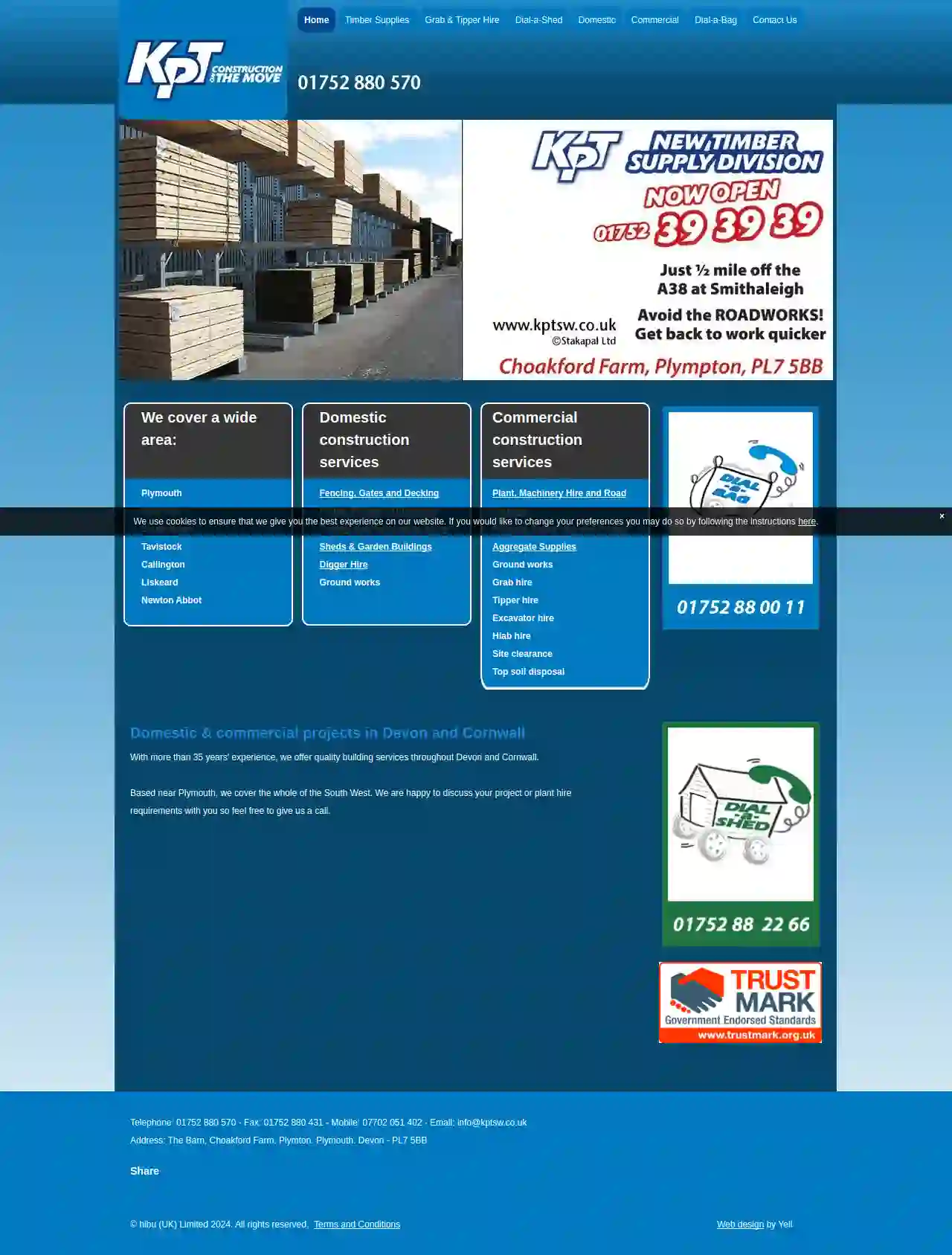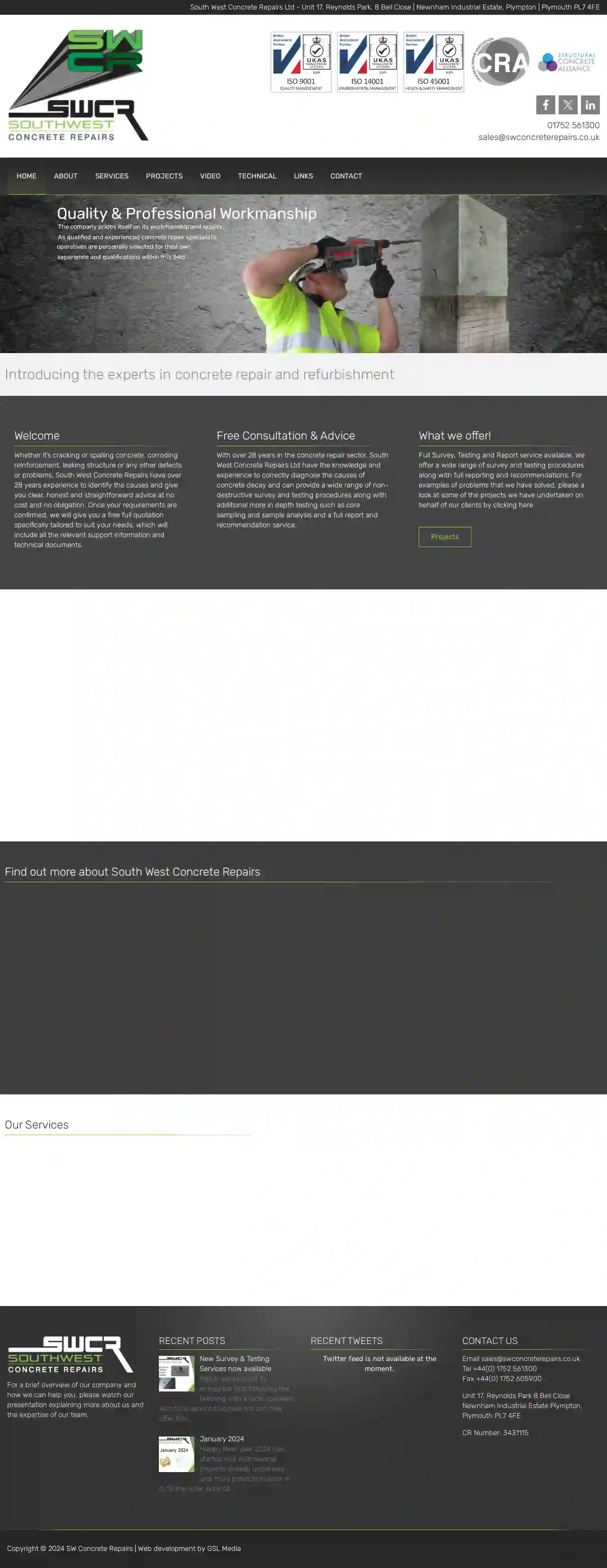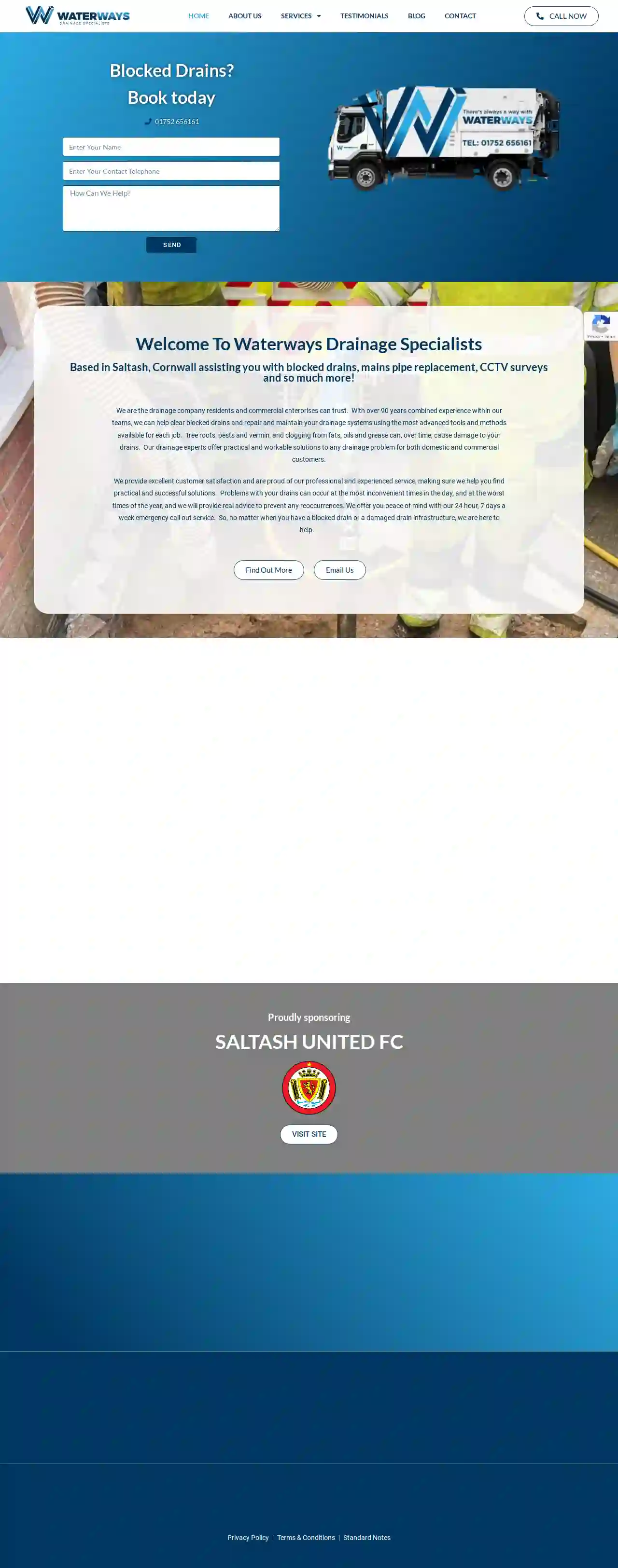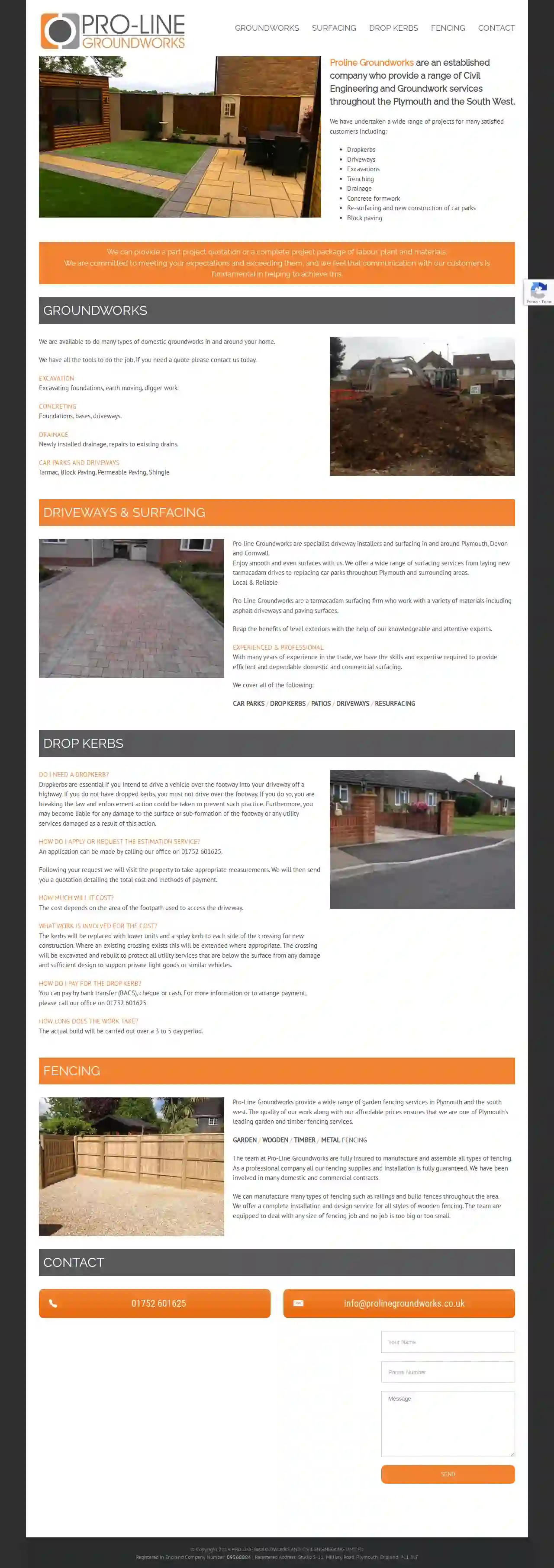Excavation Contractors Saint Budeaux
Best Excavation Contractors in Saint Budeaux
Get up to 3 Excavating Contractors quotes for your project today! Compare profiles, reviews, accreditations, portfolio, etc... and choose the best offer.

Dream Lofts
58 reviews25 Firlands Road, Torquay, TQ2 8EL, GBDream Lofts South West With over a decade of experience specialising in quality loft conversions in Torbay and the surrounding areas. Dream Lofts can build you the loft space you have always dreamed of... We deliver outstanding service and support at competitive prices. All of our work comes with a Dream Lofts 5 year guarantee. From design to completion you can trust Dream Lofts to deliver... We will sit with you at the outset of your build and give you a feel for what your loft space can offer you. In addition, we will listen to what you want from your conversion and bring these two things together to make the loft room you have always dreamed of. Turn your loft void into a new bedroom, maybe with en-suite or a bright and light playroom for your children. How about an office with a view of the treetops? However you decide to make use of the space, let Dream Lofts help you with our experience and quality craftsmanship. Enjoy a complete service... From drawing up your plans, submitting planning permissions (if required), to the loft conversion itself - you can have peace of mind that the whole process is being looked after from start to finish. If you are looking for partial installation or a full loft conversion, we can help.
- Services
- Why Us?
- Gallery
Get Quote
KPT
The Barn, Choakford Farm, Choakford Farm. Plymton. Plymouth. Devon, Plymouth, PL7 5BB, GBDomestic & commercial projects in Devon and Cornwall With more than 35 years' experience, we offer quality building services throughout Devon and Cornwall. Based near Plymouth, we cover the whole of the South West. We are happy to discuss your project or plant hire requirements with you so feel free to give us a call. Domestic construction services Fencing, Gates and Decking Patios, Paving & Driveways Turfing and Hard Landscaping Sheds & Garden Buildings Digger Hire Ground works Commercial construction services Plant, Machinery Hire and Road Haulage Fencing, Fence Hire and Paving Aggregate Supplies Ground works Grab hire Tipper hire Excavator hire Hiab hire Site clearance Top soil disposal
- Services
- Why Us?
- Gallery
Get Quote
South West Concrete Repairs Ltd
53 reviewsUnit 17, Reynolds Park, 8 Bell Close Newnham Industrial Estate Plympton, Plymouth, Reynolds Park 8 Bell Close Newnham Industrial Estate Plympton, PL7 4FE, GBQuality & Professional Workmanship The company prides itself on its workmanship and quality. As qualified and experienced concrete repair specialists, operatives are personally selected for their own experience and qualifications within this field. Why Choose SWCR Ltd? SWCR Ltd provide a service which differentiates us from our competitors, by giving an excellent service which not only meets our client objectives and requirements, but exceeds their expectations so we become their 1st choice and they want to work with us again and again. Promote Business Excellence Understanding our clients, subcontractors and suppliers. Providing best value solutions and eliminating problems. Setting ourselves the highest standards in health & safety. Introducing the experts in concrete repair and refurbishment WelcomeWhether it’s cracking or spalling concrete, corroding reinforcement, leaking structure or any other defects or problems, South West Concrete Repairs have over 28 years experience to identify the causes and give you clear, honest and straightforward advice at no cost and no obligation. Once your requirements are confirmed, we will give you a free full quotation specifically tailored to suit your needs, which will include all the relevant support information and technical documents. Free Consultation & Advice With over 28 years in the concrete repair sector, South West Concrete Repairs Ltd have the knowledge and experience to correctly diagnose the causes of concrete decay and can provide a wide range of non-destructive survey and testing procedures along with additional more in depth testing such as core sampling and sample analysis and a full report and recommendation service. What we offer! Full Survey, Testing and Report service available. We offer a wide range of survey and testing procedures along with full reporting and recommendations. For examples of problems that we have solved, please a look at some of the projects we have undertaken on behalf of our clients by clicking here Quality Work From Approved Contractor To make sure that we not only meet your requirements, but exceed your expectations South West Concrete Repairs Ltd have developed a full Quality Management System, which has now been certified to ISO 9001 (British and International standard). Our Quality Policy is available on request. Find out more about South West Concrete Repairs SWCR provide a service which differentiates us from our competitors. About Us SWCR has a range of services suited to your needs in many specialist areas. Our Services SWCR offer technical advice on any aspects of concrete repair and refurbishment. Tech Downloads SWCR have carried out a wide variety of projects – click to view our Case Studies. View Projects Our Services
- Services
- Why Us?
- Gallery
Get Quote
Waterways Drainage Specialists Ltd
4.929 reviewsSaltash, GBWelcome To Waterways Drainage Specialists Based in Saltash, Cornwall, we assist you with blocked drains, mains pipe replacement, CCTV surveys, and so much more! We are the drainage company that residents and commercial enterprises can trust. With over 90 years of combined experience within our teams, we can help clear blocked drains and repair and maintain your drainage systems using the most advanced tools and methods available for each job. Tree roots, pests and vermin, and clogging from fats, oils, and grease can, over time, cause damage to your drains. Our drainage experts offer practical and workable solutions to any drainage problem for both domestic and commercial customers. We provide excellent customer satisfaction and are proud of our professional and experienced service, making sure we help you find practical and successful solutions. Problems with your drains can occur at the most inconvenient times of the day, and at the worst times of the year, and we will provide real advice to prevent any reoccurrences. We offer you peace of mind with our 24-hour, 7 days a week emergency call-out service. So, no matter when you have a blocked drain or a damaged drain infrastructure, we are here to help.
- Services
- Why Us?
- Gallery
Get Quote
Devon Party Walls Ltd
518 reviews10-11 Heathfield Terrace, London, GBDevon Party Walls Ltd: Your Specialist Party Wall Experts in Devon Devon Party Walls Ltd is a specialist practice providing comprehensive Party Wall services across Devon. We are dedicated to providing a personal and responsive service, always happy to offer free advice to guide you through the complexities of party wall matters. Our team, led by Andy Lane, a fully qualified Member of the Faculty of Party Wall Surveyors (FPWS) with over 30 years of experience in the building and property industries, is committed to delivering exceptional customer service. We comply with the FPWS professional code of conduct and are fully insured, ensuring peace of mind for our clients. Whether you are a building owner, adjoining owner, or a designer, we are here to assist you with all your party wall needs. We offer fixed prices for defined work and accept both Agency and Statutory appointments. Our commitment to excellence is reflected in our outstanding customer reviews. We are proud to have earned the trust and satisfaction of our clients, who consistently praise our expertise, professionalism, and responsiveness. Contact us today for a free consultation and let us help you navigate the party wall process with confidence.
- Services
- Why Us?
- Our Team
- Testimonials
- Gallery
Get Quote
Mallett Drainage
521 reviews56 St Budeaux Close, Otter St Mary, Devon, Ottery St Mary, EX11 1HR, GBMallett Drainage: Your Reliable Drainage Solution in East Devon Mallett Drainage is a local, honest, and reliable drainage service serving East Devon and the surrounding areas. We are committed to providing high-quality, professional services for both domestic and commercial clients. Whether you're dealing with a blocked drain, need a drain repair, or require a comprehensive drain cleaning, our team of experienced drainage specialists is here to help. We understand the inconvenience and stress that drainage issues can cause. That's why we offer a fast response and 24-hour call-out service, ensuring that we're there for you whenever you need us. We also pride ourselves on our transparent pricing, with no hidden extras, so you can be confident in the cost of our services. Our services include: Blocked drains and drain unblocking Drain repair Drain cleaning CCTV drain surveys (report included at extra cost) High-pressure jetting Root removal and root cutting Drain excavation Duct tracing We are available 24/7, 365 days a year to provide you with the drainage solutions you need. Contact us today for a free quote or to discuss your drainage requirements.
- Services
- Why Us?
- Gallery
Get Quote
JHM groundwork's + utilities Ltd
Buckingham place, Plymouth, PL5 2EN, GBA Solid Ground for your Project JHM Groundwork’s + utilities Ltd is a young company with a very enviable reputation. We pride ourselves on our commitment to provide a professional and speedy service at all times, whilst maintaining the highest quality of work. Every employee is Fully insured and qualified to carry out our works. We are a competent, reliable and professional family run business. Delivering groundwork and utilities projects in Plymouth.
- Services
- Why Us?
- Gallery
Get Quote
Special's Excavating LLC
54 reviews331 Winchester Road, Winsted, 06098, GBNo Job Is to Big for Us. We Get It Done. At Special’s Excavating LLC, we are committed to delivering top quality services for all of your excavation needs. We’ve been serving the Winsted, CT area for over 10 years with many years of experience in the industry under our belt. Whether you need us to handle a major project or tackle a small job, our contractors have the expertise and experience to get the job done right. Our team is comprised of professionals with extensive knowledge in excavating and foundation matters, from grading and drainage systems to property clearing and commercial snow removal CT services. We also offer high-quality driveway, patio, and walkway installation, so you can enhance the look and functionality of your outdoor space. With our reliable services and
- Services
- Why Us?
- Our Team
- Gallery
Get Quote
Proline Groundworks
52 reviewsStudio 5-11, Millbay Road, Plymouth, England, PL1 3LF, GBProline Groundworks: Your Trusted Partner for Groundwork and Surfacing Solutions in Plymouth and the South West Proline Groundworks is an established company with a proven track record of delivering high-quality civil engineering and groundwork services throughout Plymouth and the South West. We are committed to exceeding our clients' expectations by providing reliable, efficient, and professional solutions for a wide range of projects. Our team of experienced professionals has the skills and expertise to handle any project, big or small. We take pride in our attention to detail and our commitment to delivering exceptional results. We are fully insured and guarantee all our work, giving you peace of mind. Whether you need a new driveway, a drop kerb, or a complete site preparation, Proline Groundworks is your one-stop shop for all your groundwork and surfacing needs. We offer a comprehensive range of services, including: Excavation Drainage Concrete formwork Resurfacing and new construction of car parks Block paving Tarmac surfacing Drop kerbs Fencing We are committed to providing our clients with a personalized service and clear communication throughout the project. We work closely with you to understand your needs and ensure that the final result meets your expectations. Contact us today for a free, no-obligation quote. We look forward to hearing from you!
- Services
- Why Us?
- Gallery
Get Quote
C D C Groundworks Ltd
51 reviews1 Hooe Manor, Belle Vue Road, 1 Hooe ManorBelle Vue RoadPlymouth, Plymouth, PL9 9NR, GBCDC Groundworks of Plymouth Devon is an independent, family run company which specialises in all aspects of commercial ground preparation and civil engineering. Based in Plymouth, CDC Groundworks Ltd is centrally located to undertake work throughout Devon and Cornwall. All employees are CITB and CPCS qualified, with years of knowledge and experience of working within the industry. A reliable, efficient and professional attitude to all work undertaken by CDC Groundworks Ltd has led to high customer satisfaction and repeat business from companies both large and small. Within the last few years CDC Groundworks Ltd has undertaken work for commercial companies, farms, private individuals and charities such as the National Trust. All works undertaken by CDC Goundworks Ltd are fully insured and guaranteed.
- Services
- Why Us?
- Testimonials
- Gallery
Get Quote
Over 13,059+ Excavation Pros on our directory
Our excavation experts operate in Saint Budeaux & beyond!
ExcavationHQ has curated and vetted Top Excavation Contractors near Saint Budeaux. Find a reliable pro today.
Frequently Asked Questions About Excavation Contractors
- Planning and Surveying: Defining the excavation area, marking utility lines, and determining the required depth and grade.
- Site Preparation: Clearing vegetation, removing obstacles, and ensuring site accessibility.
- Excavation: Using appropriate equipment (excavators, backhoes, etc.) to remove earth and create the desired excavation.
- Hauling and Disposal: Transporting excavated material to designated disposal sites, complying with environmental regulations.
- Backfilling and Compaction: Refilling the excavation with suitable material and compacting it to achieve the required density and stability.
- Grading and Finishing: Leveling and shaping the surface to the final grade for landscaping or construction.
- Topsoil Removal: Stripping the fertile topsoil layer from a site, often preserving it for landscaping.
- Trench Excavation: Digging long, narrow trenches for utilities (pipes, cables) or foundations.
- Basement Excavation: Removing earth to create a space for a basement beneath a structure.
- Pool Excavation: Digging a precise hole for installing a swimming pool.
- Roadway Excavation: Removing earth and preparing the ground for road construction.
- Demolition Excavation: Clearing debris and preparing the site after demolition.
- Channel Excavation: Creating channels for drainage or irrigation.
- Clear the Area: Remove any obstacles, including vehicles, outdoor furniture, landscaping features, or structures, from the excavation zone and surrounding area.
- Mark Existing Features: Identify and mark underground utilities, septic tanks, sprinkler systems, or other buried elements you want to protect.
- Protect Landscaping: Use tarps or fencing to shield trees, shrubs, gardens, or other landscaping elements from damage.
- Provide Access: Ensure the excavation contractor has clear access to the work area, including gates wide enough for equipment.
- Discuss Logistics: Coordinate with the contractor regarding parking arrangements, material delivery, and any special instructions or concerns you might have.
- Project Size and Scope: The larger and more complex the excavation, the higher the cost.
- Soil Type: Different soil types require different equipment and techniques, impacting costs. Rocky or clay-rich soil can be more expensive to excavate than loose soil.
- Accessibility: Difficult-to-access sites might require specialized equipment or additional labor, increasing expenses.
- Disposal Costs: Hauling away excavated material (soil, rocks, etc.) to disposal sites incurs additional fees.
- Permits and Inspections: Depending on local regulations, permits and inspections might be required, adding to the overall cost.
What is the excavation process?
What are the different types of excavation?
How do I prepare my property for excavation?
How much does excavation cost?
What is the excavation process?
- Planning and Surveying: Defining the excavation area, marking utility lines, and determining the required depth and grade.
- Site Preparation: Clearing vegetation, removing obstacles, and ensuring site accessibility.
- Excavation: Using appropriate equipment (excavators, backhoes, etc.) to remove earth and create the desired excavation.
- Hauling and Disposal: Transporting excavated material to designated disposal sites, complying with environmental regulations.
- Backfilling and Compaction: Refilling the excavation with suitable material and compacting it to achieve the required density and stability.
- Grading and Finishing: Leveling and shaping the surface to the final grade for landscaping or construction.
What are the different types of excavation?
- Topsoil Removal: Stripping the fertile topsoil layer from a site, often preserving it for landscaping.
- Trench Excavation: Digging long, narrow trenches for utilities (pipes, cables) or foundations.
- Basement Excavation: Removing earth to create a space for a basement beneath a structure.
- Pool Excavation: Digging a precise hole for installing a swimming pool.
- Roadway Excavation: Removing earth and preparing the ground for road construction.
- Demolition Excavation: Clearing debris and preparing the site after demolition.
- Channel Excavation: Creating channels for drainage or irrigation.
How do I prepare my property for excavation?
- Clear the Area: Remove any obstacles, including vehicles, outdoor furniture, landscaping features, or structures, from the excavation zone and surrounding area.
- Mark Existing Features: Identify and mark underground utilities, septic tanks, sprinkler systems, or other buried elements you want to protect.
- Protect Landscaping: Use tarps or fencing to shield trees, shrubs, gardens, or other landscaping elements from damage.
- Provide Access: Ensure the excavation contractor has clear access to the work area, including gates wide enough for equipment.
- Discuss Logistics: Coordinate with the contractor regarding parking arrangements, material delivery, and any special instructions or concerns you might have.
How much does excavation cost?
- Project Size and Scope: The larger and more complex the excavation, the higher the cost.
- Soil Type: Different soil types require different equipment and techniques, impacting costs. Rocky or clay-rich soil can be more expensive to excavate than loose soil.
- Accessibility: Difficult-to-access sites might require specialized equipment or additional labor, increasing expenses.
- Disposal Costs: Hauling away excavated material (soil, rocks, etc.) to disposal sites incurs additional fees.
- Permits and Inspections: Depending on local regulations, permits and inspections might be required, adding to the overall cost.